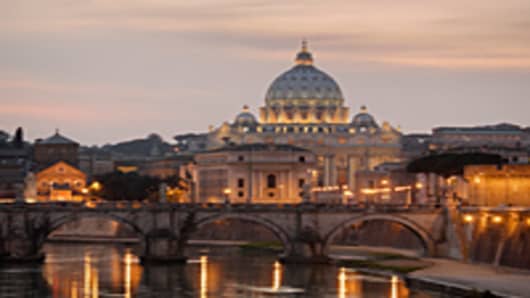The Italian government is still wrangling over how best to balance its budget, losing credibility with key leaders and opinion formers.
The government, headed by Silvio Berlusconi, was resoundingly criticized for its handling of the economy at a gathering of political, economic and business leaders over the weekend.
It was difficult to find anyone at the Ambrosetti conference in Cernobbio, on the shores of Lake Como, with a good word to say about Berlusconi. Even the President of Italy, Giorgio Napolitano, urged the government to find agreement.
Corrado Passera, Chief Executive of Italian bank Intesa Sanpaolo, told CNBC that he believes the Italian government "will deliver on its promise in the end."
"We have to make sure that the markets are sure that we will bring debt levels down," Passera cautioned.
Berlusconi, one of Italy's richest men, has already survived court cases and scandal about his private life. On Friday, taped conversations between the billionaire and a newspaper editor featured him complaining that Italy was a "shit country" and saying: "This country makes me sick. I am going to leave in a few months."
Italy's government debt of 119 percent of gross domestic product in 2010 was second only to Greece in the euro zone, according to Eurostat.
Balancing the Budget Is Crucial
The European Central Bank (ECB) agreed to intervene in the Italian bond market in August, after it was targeted by so-called bond vigilantes, driving up the cost of borrowing. Help from the ECB came on the condition of stringent new austerity measures aimed at bringing Italy's debt under control.
There are concerns that Berlusconi's government is attempting to water down some of the measures agreed as part of the 45 billion euros ($64 billion) austerity package which is aimed at balancing the budget by 2013.
"This is absolutely decisive to consolidating and reinforcing the quality and the credibility of Italy's strategy and credit-worthiness," Jean-Claude Trichet, President of the European Central Bank, said Saturday at the conference.
With the very survival of Berlusconi's government in question, one of the topics discussed over lunch at the Villa d'Este was who might take over if the current government is forced out.
Mario Monti, the former European Commissioner who attended the conference, was one of the names most frequently in the frame. "The overall objective for Italy has to be balancing the budget," Monti told CNBC.
Enrico Letta, deputy leader of the opposition Democratic Party, told CNBC.com that the current government is "not serious" and declared his party's intention to lead Italy into greater "fiscal political union" with the rest of Europe.
"We have to complete the European project," he said.
The opposition has been criticized for not supporting the government effectively.
"We are ready to discuss problems with the government but they don't have clear proposals. Their proposals change every day," he said.
Letta added that he believes the budget will be voted through by the end of September.
Italy Must Become More Like UK
Some of the more optimistic delegates point out that Italy has a highly skilled labor force and low levels of household debt. There are also geographic advantages of being close to the Middle East.
"The problems are so broadly based that even the Italian political system has to do something about it," Francesco Confuorti, president of Advantage Financial, told CNBC.com.
"It's a good start to get the debt under control but on the growth side, that has to come from private capital."
Other businessmen concur on the importance of the private sector.
"You have to create incentives to invest on the equity side. That's what will reinflate the economy and create jobs. We need more government and less state," Marco Tronchetti Provera, chairman of Pirelli, the tyre manufacturer, told CNBC.com.
"They have difficulty agreeing about minor issues, so I don't believe it will be possible to agree on big issues," Provera added. "Something has to happen, otherwise we will have the same things happening in a few months."
Provera, whose company employs around 30,000 people globally, said that labor costs in Italy should be brought down.
One of the issues highlighted by many of the delegates at Cernobbio is the public ownership of private companies in Italy.
The Italian government still controls companies which account for around a third of GDP. Its holdings include a 30 percent stake in oil and gas giant ENI, and 32 percent of engineering and aerospace group Finmeccanica.
Confuorti believes that the government should gradually sell off its stakes in these companies, over the next 5-10 years, once their market value has returned.
"There has to be more competitiveness. The free market is an unbiased force and creates normal equilibrium between competitive stakeholders," he said.
"We have to become more Anglo-Saxon and look to the UK rather than France and Germany."



